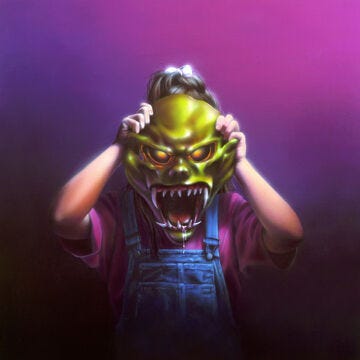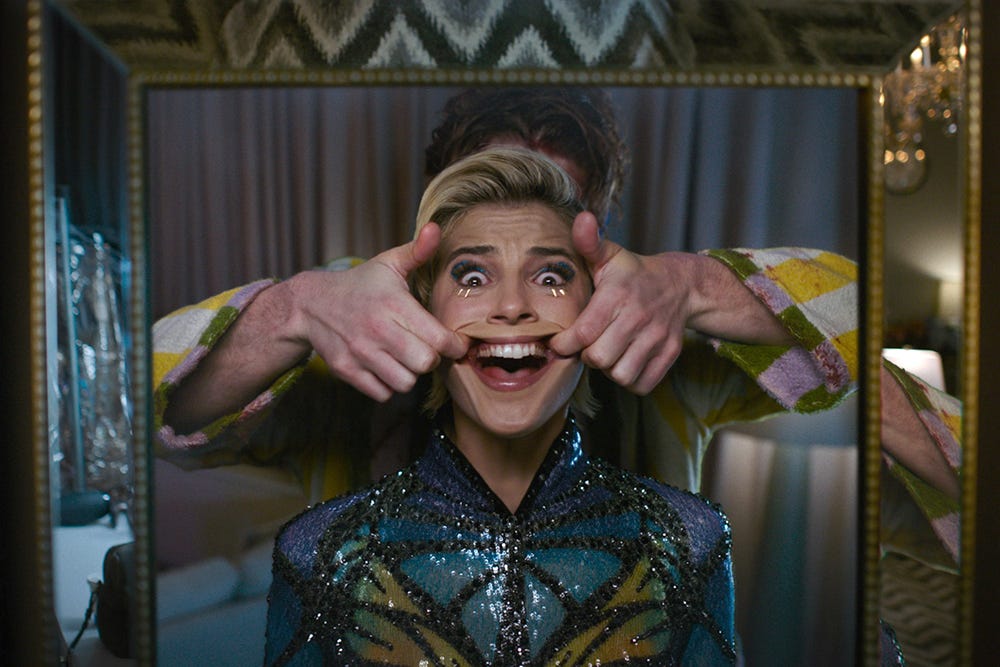Hey y’all! It’s time I get a little personal again. Not too much, though! I’ve gotta keep my therapist fed. Normally, this would include another writer’s essay. However, I’m writing this only a few hours before you’re reading it. After seeing Smile 2 last night, I had some things to get off of my chest. This a little different from my usual newsletters, but that’s the point. Let’s have a little fun, dissect some horror, and even ourselves if the mask fits.
Smile (2022) came out and stunned me for a few reasons. Random people online were saying how triggering it was for those with mental disorders. Others complained about the technicalities of the production. It reached deep within me, though, and stayed for a few days. Smile 2 is no different. And you don’t often come by a sequel so synchronized with it’s predecessor the way this one is.
Smile 2: Exploring Trauma, Addiction, & Identity
Addiction is like another member of my expansive family tree. The root of evil is usually alcohol, but there were a few outliers who explored other territories. I grew up hearing other’s opinions about the addictions that rotted our roots.
"I’m not helping him anymore.”
“She’s gonna have to figure this out for herself.”
Addiction causes trust issues for both parties, which is why it works well as a plot device for this sequel. Horror usually aligns mental illness and addiction with the concept of the supernatural. The paranormal doesn’t appear for everyone. That makes it an easy tool for toying with someone’s reality. No matter how good or bad the movie is, the mere idea of not being believed in the way that Skye Riley experiences terrifies me. It reminds me that our perception is ours alone and the stigmas revolving around mental illness make you less of a reliable narrator.
Watching the mistrust slowly eat away at everyone involved draws you further into a spiral. On the one hand, Skye Riley is sober but her trauma is what eats at her now. On the other hand, her actions mirror those of an addict. The cycle of addiction gives others an easy target to point a finger at. It’s easier for them to lay blame on someone’s substance abuse rather than taking the time to comprehend those cries. Skye Riley’s car crash and the height of her addiction are one and the same. Yet, her mother and her team only ever ask about and act to prevent her relapse.
Movies like Nightmare on Elm Street and Smile 2 lead their protagonists and audience to question what’s real. Ultimately, this is what makes it scary. No one ever believes the woman claiming that a man with knives for fingers is threatening her. Smile 2 adds a layer of identity and how it can be warped with your grasp on reality. Her actions before getting sober were out of character, but she doesn’t have a strong sense of self to acknowledge that. She believes that all she does is destroy people’s lives and her relationships. She thinks she’s a burden. All of this further fuels the supernatural elements of the story.
As I get older, I’m becoming more and more aware of how the mental illness I’ve lived with can easily transform into something bigger with genetics. It’s scary to not have a proper hold of who you truly are. And it makes you vulnerable to manipulation: internally and externally (and paranormally?). Holding onto trauma can only exacerbate it, too. Let me stop there before I say too much and spoil something.
All of this is to say that I loved Smile 2 and the direction they chose to go in for this sequel. My friends and I discussed some of the flaws post-watch, but I wasn’t even phased by them during the movie. The writing is SO good, but the performances are even better. It’s excellently casted with Naomi Scott giving us a SCREAM QUEEN performance! The middle does feel like a bit of a drag, but it picks back up again until the credits roll. There’s a chance this isn’t the last you’ll hear from me about this movie.






